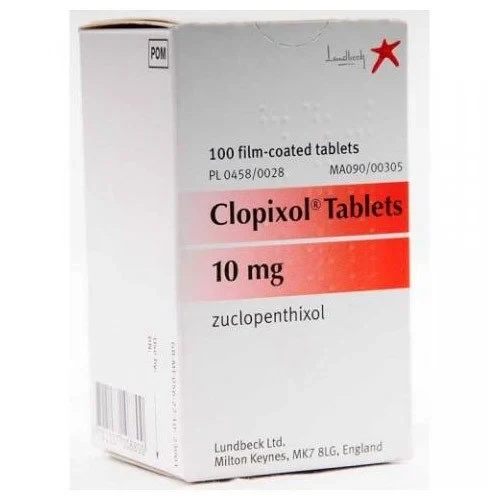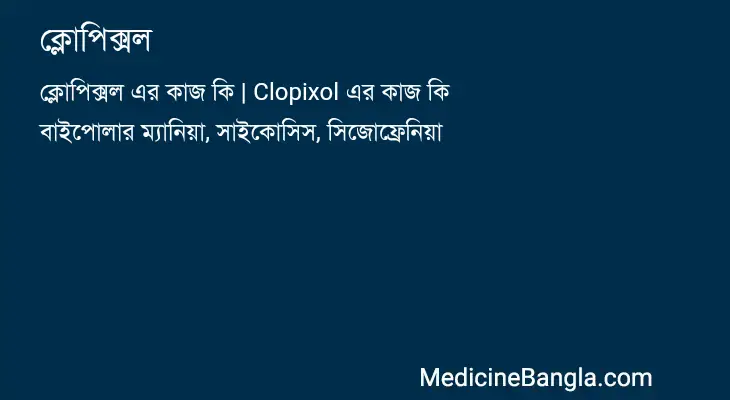ক্লোপিক্সল
Zuclopenthixol has high affinity for D1 and D2 receptors and α-adrenoreceptors. It also has slight antihistamine properties and blocks serotonergic properties.
সুচিপত্র
| বাণিজ্যিক নাম | ক্লোপিক্সল |
| জেনেরিক | জুক্লোপেন্থিক্সল |
| ধরণ | ইনজেকশন, ট্যাবলেট |
| পরিমাপ | 50mg/ml, 200mg/ml, 2mg, 10mg, 25mg, 10mg/vial, |
| দাম | |
| চিকিৎসাগত শ্রেণি | Phenothiazine related drugs |
| উৎপাদনকারী | Lundbeck Pakistan (pvt) Ltd,, Lundbeck, Lilac, Lundbeck Limited |
| উপলভ্য দেশ | Pakistan, Bangladesh, United Kingdom, Australia, Netherlands, Switzerland, |
| সর্বশেষ সম্পাদনা | January 7, 2025 at 1:49 am |
খাওয়ার নিয়ম / ব্যবহারের নিয়ম
ক্লোপিক্সল খাওয়ার নিয়ম / ব্যবহারের নিয়ম
Intramuscular-
Chronic psychosis:
- Adult: As decanoate ester: Initially, a test dose of 100 mg by deep IM into the upper outer buttock or lateral thigh to access tolerance, followed after at least 1 wk by 200-500 mg or more, repeated at 1-4 wkly intervals according to response. Max dose: 600 mg wkly. Inj >2 ml to be distributed between 2 inj sites.
- Elderly: Reduce dose to ¼ or ½ of usual initial dose.
Psychoses:
- Adult: As acetate: 50-150 mg via deep IM inj. May repeat, if needed, after 2-3 days. An additional dose 1-2 days after the 1st dose may be required in some patients. Not >4 inj should be given in a max course of 2 wk and total dose should not exceed 400 mg. Maintenance: May start oral zuclopenthixol HCl 2-3 days after the last acetate inj or begin IM inj of decanoate with the last inj of the acetate.
- Elderly: As acetate ester: Dose reduction may be needed. Max: 100 mg/dose.
Oral-
Psychoses:
- Adult: Initially, 20-30 mg daily in divided doses. Usual maintenance dose: 20-50 mg daily. Up to 150 mg daily for severe or resistant cases.
খাবারের সাথে বা ছাড়াই নেওয়া যেতে পারে।
পার্শ্বপ্রতিক্রিয়া
Drowsiness, blurred vision, tachycardia, nausea, dizziness, headache, excitement, postural hypotension, hyperprolactinaemia, sexual dysfunction, ECG changes (prolongation of QT interval and T wave changes), hyperthermia. Extrapyramidal symptoms may occur, especially during the early phase of treatment; urinary frequency or incontinence; tardive dyskinesia.
সতর্কতা
Hepatic and renal impairment, heart disease, recent acute MI, arrhythmias, significant bradycardia (<50 beats/min), severe respiratory disease, epilepsy (and conditions at risk of epilepsy, e.g. alcohol withdrawal or brain damage), Parkinson's disease, acute angle glaucoma, prostatic hypertrophy, hypothyroidism, hyperthyroidism, myasthenia gravis, phaeochromocytoma. Patients at risk of stroke and QT interval prolongation. Avoid abrupt withdrawal. Ability to drive a car or operate machinery may be impaired.
মিথস্ক্রিয়া
Zuclopenthixol may enhance the sedative effects of alcohol and the effects of barbiturates and other CNS depressants. Zuclopenthixol reduces the antihypertensive effect of guanethidine. Concomitant use of metoclopramide and piperazine with zuclopenthixol increases the risk of extrapyramidal symptoms. Increased risk of severe neurotoxicity with lithium and sibutramine. Increased anticholinergic side effects with drugs with anticholinergic properties.
গর্ভাবস্থাকালীন ব্যবহার
গর্ভাবস্থা বিভাগ সি: পশুপাখির উপর অধ্যয়ন ভ্রূণের উপর বিরূপ প্রভাব প্রকাশ করেছে (টেরেটোজেনিক বা ভ্রূণদেহী বা অন্যান্য) এবং মহিলাদের উপর কোনও নিয়ন্ত্রিত গবেষণা পাওয়া যায় নি। এজন্য ওষুধগুলি তখনই দেওয়া উচিত যদি সম্ভাব্য সুবিধা ভ্রূণের সম্ভাব্য ঝুঁকিটিকে ন্যায়সঙ্গত করে তোলে।
বৈপরীত্য
Hypersensitivity. Comatose states e.g. alcohol, barbiturate and opiate intoxications; porphyria. children.
অতিরিক্ত সতর্কতা
Renal Impairment: Intramuscular:
- Chronic psychosis: Dose reduction may be needed.
- Psychoses: Renal failure: Half of the normal dose.
Oral: Dose reduction may be needed.Hepatic Impairment: Intramuscular:
- Chronic psychosis: Dose reduction may be needed.
- Psychoses: Half of the normal recommended dose.
Oral: Dose reduction may be needed.
তীব্র ওভারডোজ
Symptoms: Somnolence, extrapyramidal symptoms, convulsions, hypotension, shock, hyper or hypothermia, ECG changes e.g. QT prolongation, torsade de pointes, cardiac arrest, ventricular arrhythmias and coma. Management: Treatment is symptomatic and supportive with close monitoring of the respiratory and CV systems. Do not use adrenaline (epinephrine) in these patients.
অন্যান্য ওষুধের সাথে প্রতিক্রিয়া
সংরক্ষণ
২৫ ডিগ্রি সেলসিয়াসের নীচে এবং আলো থেকে দূরে রাখুন।
https://www.ebi.ac.uk/chebi/searchId.do?chebiId=CHEBI:51364
http://www.hmdb.ca/metabolites/HMDB0015561
http://www.genome.jp/dbget-bin/www_bget?drug:D03556
https://pubchem.ncbi.nlm.nih.gov/summary/summary.cgi?cid=5311507
https://pubchem.ncbi.nlm.nih.gov/summary/summary.cgi?sid=46507341
https://www.chemspider.com/Chemical-Structure.4470984.html
http://www.bindingdb.org/bind/chemsearch/marvin/MolStructure.jsp?monomerid=79209
https://mor.nlm.nih.gov/RxNav/search?searchBy=RXCUI&searchTerm=114176
https://www.ebi.ac.uk/chebi/searchId.do?chebiId=51364
https://www.ebi.ac.uk/chembldb/index.php/compound/inspect/CHEMBL53904
https://zinc.docking.org/substances/ZINC000000601293
http://bidd.nus.edu.sg/group/cjttd/ZFTTDDRUG.asp?ID=DAP000845
http://www.pharmgkb.org/drug/PA452629
https://www.drugs.com/international/zuclopenthixol.html
https://en.wikipedia.org/wiki/Zuclopenthixol









